What Science Says About Knee Kinesiography
A Revolutionary Clinical Assessment Platform with KneeKG®
KneeKG commercialized by Emovi Inc is a regulatory cleared* knee pain clinical assessment tool used to conduct a Knee Kinesiography. This technology evaluates knee functional deficiencies linked to patients’ current symptoms or orthopaedic disease progression.

Integrated in the Care Algorithm, this Approach Has Demonstrated:

Improving patient outcomes and satisfaction
When integrated in patient education, Knee Kinesiography with the KneeKG system provides statistically significant and clinically superior improvements compared to the results obtained with current standard of care (Cagnin et al. 2020)1, as recognized in the practice guidelines published by the American Association of Orthopaedic Surgeons (AAOS), which guidelines are also endorsed by the American Association of Hip and Knee Surgeons (AAHKS)6
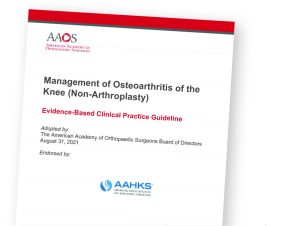
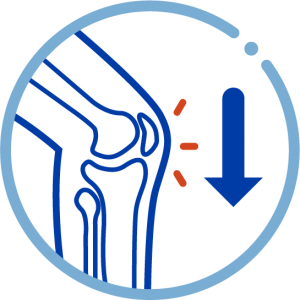
42 %
less pain1
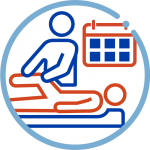
88 %
Patients Treatment Adherence1
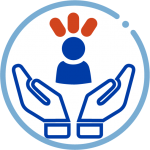
84 %
patient satisfaction2

63 %
of patients chose to delay surgery after 1 year3
80% of these patients had postponed surgery after 4 years3

HIGH PRECISION
to confirm appropriateness for surgery4

24 %
of patients not requiring surgery can be removed before entering the queue for the consultation of a surgeon5
You Want to Read More Literature?
Knee Kinesiography with KneeKG has over 100 publications.
Founding Clinical Committee
Emovi is proud to present the four (4) founding members of its clinical comity, they have participated in numerous clinical studies demonstrating the value of the KneeKG system.

Guy Grimard, MD, FRCSC
Guy Grimard is an orthopaedic surgeon. He obtained his Medical Degree from the University of Sherbrooke, in 1983 and went on to graduate in orthopaedic surgery from the University of Montreal, in 1988. He completed his specialization in pediatric orthopedics at: CHU Sainte-Justine (in Montreal), the Royal Children’s Hospital (in Melbourne) and Hôpital Debrousse (in Lyon). He also completed his training in epidemiology and biostatistics at McGill University. He has been a clinical assistant professor, in the department of surgery and has been an orthopedic surgeon at CHU Sainte-Justine since 1994, as well as an active member of the Shriners Hospital, in Montreal. He was the Chief of the Orthopedics, at CHU Sainte-Justine from 2010 to 2014 and is an active member of the CHU Sainte-Justine Research Center. Dr. Grimard has also been a consultant in performance medicine, at Cirque du Soleil. He has served on the Executive Committee of the Quebec Orthopedic Association for 5 years. In addition he enjoys sports, having practiced ice hockey for over 30 years, and more recently becoming an avid cyclist. His practice, clinical expertise and research interests, are mainly focused on sports medicine in the pediatric population.
Dr. Pierre Ranger
Born in Montreal, a graduate of the University of Montreal’s Faculty of Medicine in 1979. Training in orthopaedic surgery at the University of Montreal from 1979 to 1985. Overspecialty in kneeligament and arthrosis surgery in 1985 and 1986, at the Centre hospitalier universitaire de Lyon (Hôpital Jules Courmont) in France and at the Karolinska University Hospital in Stockholm, Sweden. University practice at the Hôtel-Dieu in Montreal from 1986 to 1991 and at the Sacré-Coeur Hospital of Montreal as an associateprofessor of surgery at the University of Montreal in the orthopedic surgery program from 1991 to this day. Head of the orthopedic surgery department and person in charge of the arthroplasty program of the Jean-Talon Hospital from 1995 to this day. His additional activities include the functions of medical director of the Clinique chirurgicale de Laval and the Clinique de médecine sportive de Laval.


Dr. Patrick Lavigne MD, PhD, FRCSC
Dr. Patrick Lavigne completed his Doctorate in Medicine, as well as his residency in Orthopedics at the University of Montreal. Pursuant to training in Australia, Dr. Lavigne joined the Édouard Samson Orthopedic Program, where he currently holds the position of Associate Professor and Director of the Residency Training Program for Orthopedics at the University of Montreal. Dr. Lavigne also works at the CIUSSS de l’Est-de-Île-de-Montréal, as an orthopedic surgeon, specializing in arthroscopy and sports medicine. He has both a research and clinical focus, in the prevention and surgical treatment of early stage osteoarthritis. He is an orthopedic consultant to the athletes from several university and college teams.
Dr. David Baillargeon MD, CM, FRCSC
Dr. David Baillargeon has been practicing orthopedic surgery for over fifteen years. He holds a doctorate in medicine from McGill University, as well as having completed his residency in orthopedic surgery at the University of Montreal. In 2004, Dr. Baillargeon furthered his training with a subspecialty in sports medicine at the University of California, San Francisco (UCSF). During the same year, he joined the orthopedics department of the Cité de la Santé Hospital in Laval, where he was the head of the orthopedic department, from 2011 to 2019. Since he began his practice, Dr. Baillargeon has treated numerous sports injuries, for both amateurs and professionals. He has also been a consultant to many sports associations. Since 2005, Dr. Baillargeon has been the official physician for ATP and WTA players, during Rogers Cup tennis events. Dr. Baillargeon is a great sportsman himself, who regularly enjoys cycling and alpine skiing. He is also an accomplished pianist. He is married and the father of two children.
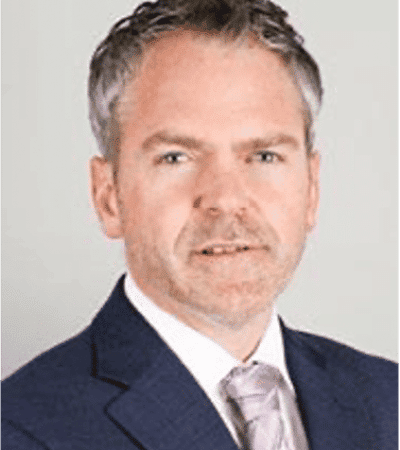
Bridge the Clinical Gap
Use Knee Kinesiography as a complimentary tool to MRI and X-Ray
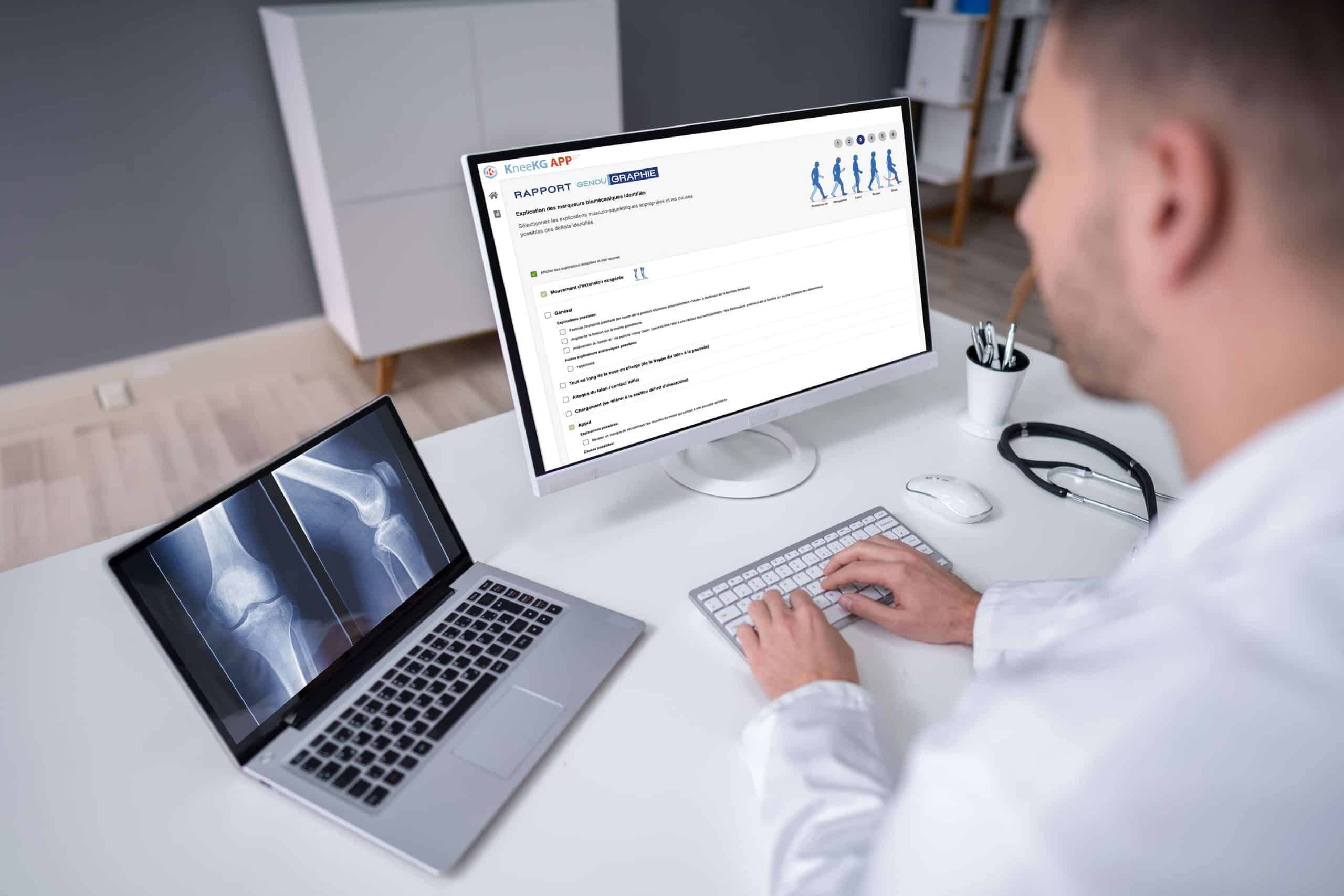
References:
-
Cagnin, A. et al. A multi-arm cluster randomized clinical trial of the use of knee kinesiography in the management of osteoarthritis patients in a primary care setting.
-
Cagnin, A. et al. Effective conservative care targeting mechanical markers as risk factors for knee osteoarthritis progression: a cluster randomized controlled trial.
-
Therrien M. et al. 2016 Real-world clinical result from a multimodal management program for knee osteoarthritis.
-
Ouakrim et al. 2018 Total knee arthroplasty candidates classification based on kinematic data analysis.
-
Planning model for knee surgeries in a public canadian health system, Kenny, D. Proposed New Model of Care at Nova Scotia Health Authority Orthopedic Department. 1–91 (2017). Internal report.
-
American Academy of Orthopaedic Surgeons Management of Osteoarthritis of the Knee (Non- Arthroplasty) Evidence-Based Clinical Practice Guideline. https://www.aaos.org/oak3cpg. Published 08/31/21

